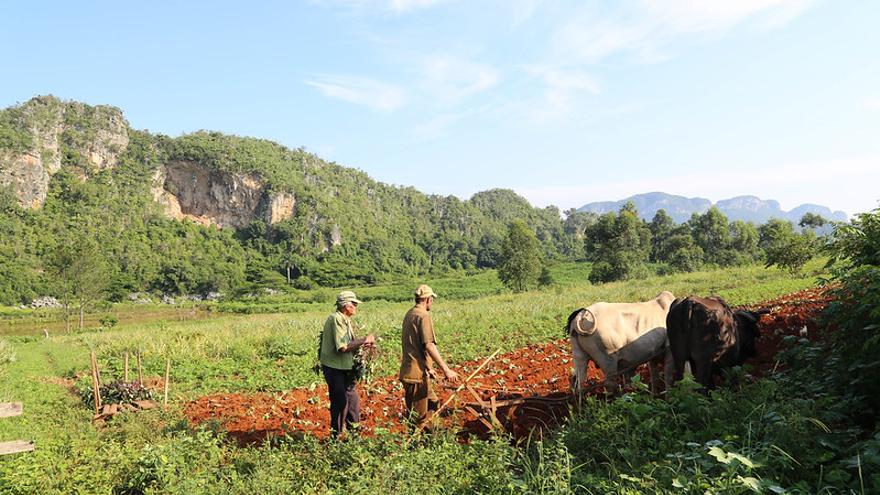
![]() 14ymedio, Havana , 15 February 2022 — At this point in history, the authorities of the Ministry of Agriculture seem to discover that the large amount of idle land has something to do with the insufficiency of food production in Cuba. And yet, the delivery of these lands continues to be very slow and does not meet the demand.
14ymedio, Havana , 15 February 2022 — At this point in history, the authorities of the Ministry of Agriculture seem to discover that the large amount of idle land has something to do with the insufficiency of food production in Cuba. And yet, the delivery of these lands continues to be very slow and does not meet the demand.
This was commented on, in a meeting with the sector, by the delegate of the ministry in the province of Villa Clara, Yhosvany Martín Peña. According to the data provided, there are at least 37,982 hectares identified as idle, many infested with invasive plants or poorly cared for. Despite the fact that 43,910 hectares have recently been handed over, this amount only satisfies 0.9% of land applicants.
The authorities asked for agility when identifying the lands and handing them over, since there are too many delays “in the notifications of the possible usufruct [leasing terms] and delay in the conclusion of the contracts,” said Amado Pérez Colina, delegate in Camajuaní.
The official also pointed out some of the main problems areas in which the sector is not doing well, among them the lack of declaration of idle land by some state companies, the erratic inspections to verify the productive potential of the surfaces and the inadequate review of contracts with producers and marketers.
Among the worst consequences, an obvious one, is the very poor production of pork, which was 39% of the forecasts in December. Milk is not performing either, delivering just 79% of the plan with 40,324,200 liters, of which only 29,829,400 reached the industry, a decrease of 9,444,400 liters.
Somewhat better was the production of eggs, which, although low, was 95% of the forecasts. According to the Vanguardia newspaper, the harvest of “various crops” was 97% complete, almost 280,000 tons less than in the previous period.
In this sense, the authorities concluded that, despite the advances in research that have been made to increase harvests, there are no certified seeds that can be used to multiply crops, it is imposible.
The worst results were those for the grain, while the banana, cassava, sweet potato and malanga improved, although far from what was desired, reports the province without providing disaggregated amounts.
The same occurs with meat sales, of which it is said that the commitment was “exceeded” without specifying data, although Camajuaní, Encrucijada and the Jibacoa Agroforestry Company did not deliver the amounts that were agreed to.
The authorities attributed to the poorly performed practice of inseminations, the “low birth rates, decreases and incorrect management, as well as deterioration in mortality and low food quality for dry periods of the year,” but they also affirmed that, in Placetas, there was a proliferation of theft and illegal slaughter of livestock, damaging the whole.
According to the measures approved by the Government to encourage food production, only producers who comply with the State’s order are authorized to slaughter livestock
Regarding the economic stock taking, 11 state entities had losses and 39 closed with negative indicators.
According to Vanguardia , Carlos Amaury Figueredo Yumar, a member of the Party’s Provincial Bureau, made a special speech in which he asked the sector for “a change of mentality, and to demonstrate with concrete production facts the values of the socialist state company and the commitment of all agricultural actors linked to the land.” The same voluntaristic speech of the last 60 years.
____________
COLLABORATE WITH OUR WORK: The 14ymedio team is committed to practicing serious journalism that reflects Cuba’s reality in all its depth. Thank you for joining us on this long journey. We invite you to continue supporting us by becoming a member of 14ymedio now. Together we can continue transforming journalism in Cuba.
